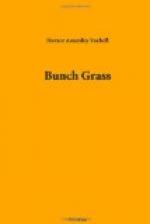“I can send you no more cheques” (wrote the parson), “not another penny will you receive from me. I pray to God that He may see fit to turn your heart, for He alone can do it. I have failed ...”
Dick showed this letter to his last and only friend, the ex-deacon, the Rev. Tudor Crisp, known to many publicans and sinners as the ‘Bishop.’ The two digested the parson’s words in a small cabin situated upon a pitiful patch of ill-cultivated land; land irreclaimably mortgaged to the hilt, which the ‘Bishop’ spoke of as “my place.” Dick (he had a sense of humour) always called the cabin the rectory. It contained one unplastered, unpapered room, carpetless and curtainless; a bleak and desolate shelter that even a sheep-herder would be loth to describe as home. In the corners were two truckle beds, a stove, and a large demijohn containing some cheap and fiery whisky; in the centre of the floor was a deal table; on the rough redwood walls were shelves displaying many dilapidated pairs of boots and shoes, also some fly-specked sporting prints, and, upon a row of nails, a collection of shabby discoloured garments, ancient “hartogs,” manifesting even in decay a certain jaunty, dissolute air, at once ludicrous and pathetic. Outside, in front, the ‘Bishop’ had laid out a garden wherein nothing might be found save weeds and empty beer bottles, dead men denied decent interment. Behind the cabin was the dust-heap, an interesting and historical mound, an epitome, indeed, of the ‘Bishop’s’ gastronomical past, that emphasised his descent from Olympus to Hades; for on the top was a plebeian deposit of tomato and sardine cans, whereas below, if you stirred the heap, might be found a nobler stratum of terrines, once savoury with foie gras and Strasbourg pate, of jars still fragrant of fruits embedded in liqueur, of bottles that had contained the soups that a divine loves— oxtail, turtle, mulligatawny, and the like. Upon rectory, glebe, and garden was legibly inscribed the grim word—ICHABOD.
“He means what he says,” growled Dick. “So far as he’s concerned I’m dead.”
“You ought to be,” said the ‘Bishop,’ “but you aren’t; what are you going to do?”
This question burned its insidious way to Dick’s very vitals. What could he do? Whom could he do? After a significant pause he caught the ‘Bishop’s’ eye, and, holding his pipe as it might be a pistol, put it to his head, and clicked his tongue.
“Don’t,” said the ‘Bishop’ feebly.
The two smoked on in silence. The Rev. Tudor Crisp reflected mournfully that one day a maiden aunt might withdraw the pittance that kept his large body and small soul together. This unhappy thought sent him to the demijohn, whence he extracted two stiff drinks.
“No,” said Dick, pushing aside the glass. “I want to think, to think. Curse it, there must be a way out of the wood. If I’d capital we could start a saloon. We know the ropes, and could make a living at it, more, too, but now we can’t even get one drink on credit. Why don’t you say something, you stupid fool?”




